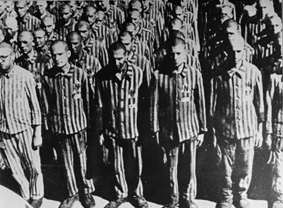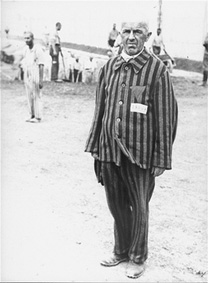
Roll-call in Buchenwald. The prisoners are Jews coming from Holland (see the "N" for Nederland on the Star of David)
Introduction
To describe the course of the day in a concentration camp is a difficult undertaking. The following description is based on the common points found in several testimonies of survivors. Of course, we do not pretend that the daily itinerary was the same in all concentration camps. Several factors influenced the condition of life in the camps, such as the SS command of the camp, the nationality and category of prisoner (political, POW, Jewish, etc.).
This account is based on testimonies collected in the following books:
- "L'ère des camps", by Olga Wormser-Migot, Union Générale d'Edition, 1973, Collection 10-18, n° 774 (France)
- "The Theory and Practice of Hell" by Eugen Kogon (how the SS and camps worked.)
- Le livre des camps by Ludo Van Eck, Editions Kritak (Belgium, 1979). Ludo Van Eck is a Belgian survivor of Dachau. This book is very difficult to find, but it is a real encyclopaedia covering most of the concentration and extermination camps.
- "Dora 1943-1945" by Brigitte d'Hainaut and Christine Somerhausen, Editions Didier Hatier (Belgium). History of the Belgian prisoners in Dora concentration camp, sub-camp of Buchenwald.
This essay is also based on testimonies from Mr. Richard Suffit (Auschwitz survivor) and Mr. Van Horen (Flossenbürg survivor) as well as what my father, Edmond Châtel, told to my mother about his experience in Vught Concentration Camp.
Vincent Châtel
You are awakened by the kapo barking at you. Hurry up! You must raise, find your shoes (but maybe somebody stole them which often means death because you'll not be able to work) and start as soon as possible the "bettenbau". From the shapeless straw mattress you'll have to make a perfect bed in a military manner, with blankets made up exactly over the straw mattress. Of course, this is nearly impossible to do and the kapo knows it. The "bettenbau" is just a good opportunity for him to beat the prisoners.
The bed is made now, and it is time for washing. You run out of the barrack and try to reach the sanitary facility. There are only a couple of sanitary facilities for hundreds of prisoners. You have just a couple of minutes for washing. It is nearly time for the morning roll call, and you know the kapos will beat the stragglers, sometimes to death.
You must have your mess-tin in hand. No mess-tin, no food. A kapo gives you approximately 10 ounces of bread and some "coffee" [see note, end of page]. Sometimes, if you are lucky, you'll receive some margarine or a thin slice of sausage with your bread. The "coffee" is tasteless. No sugar and no milk, of course. The bread you just received will be the only solid food you'll receive until tomorrow. If you have strength of will, you'll try to spare it for the rest of the day. The distribution of food is once again a good opportunity for the kapos to have some "fun". Sometimes they throw the bread in the mud, or they push you while serving the coffee, wasting it on the ground. In any case, you'll receive nothing more, and you are risking punishment for wasting food.

Roll-call in Buchenwald. The prisoners are Jews coming from Holland (see the "N" for Nederland on the Star of David)
All the prisoners are lined up in rows of ten. All the prisoners must be at the roll call, including the ones who died during the night. There, poor bodies are aligned in front of you or in front of your barrack. Under control of the SS guards and officers, the kapos are counting the thousands of prisoners. A mistake during the counting and everything must start again, making the kapos nervous and dangerous. During the roll call, you must stand at attention, even if it is raining or snowing. It is forbidden to move or to talk during the roll call. Your poor striped uniform, made from an incredibly rough cloth, does not protect you against the cold weather. Every day, several prisoners catch cold during the roll call and die in the following days. Some others die during the roll call itself. They were too weak to stand at attention during hours. Their bodies, as well as the deaths of the night, will be sent to the crematories after the roll call.
You run to join your work team. You'll leave the camp under the heavy guard of SS and kapos, always barking at you. You'll reach the yard by walk of course. Maybe you'll have to march off to the beat of the music played by the camp orchestra. Or maybe the SS will order to your work team to sing during the march. Just at the gate of the camp, there is a row of SS waiting for your work team. Beatings, insults, barking again and again...
If you are lucky, you have received a good tool, a shovel or a pickax. Otherwise, you'll have to work with your hands... and this may mean death because you'll not be able to work as fast as the guards request. The day will be long: 12-14 hours of work. The work is very hard, and often useless: to move heavy sand bags from one point to another, to extract and carry heavy stones, to dig trenches or to bore a tunnel. Maybe you are working in a factory but this does not improve your condition of life. This is extermination by work. Everything has to be done as fast as possible, and always with insults and beatings from the kapos and the SS. If a guard thinks you are not working fast enough, you'll be beat up, maybe until you die. Don't even think about stopping for a while or even slowing down. It will be considered as sabotage and this means death.
A signaling whistle again: the "lunch break" is now over. The work starts again, always at top speed. The afternoon seems harder because you are hungry and you feel you are loosing strength. A prisoner faints and the guards beat him up. If this poor man can't rise, he'll be killed and you'll have to bring his dead-weight body back to the camp for the evening roll call.
A signaling whistle again: the "lunch break" is now over. The work starts again, always at inferno. The afternoon seems harder because you are hungry and you feel you are loosing strength. A prisoner faints and the guards beat him up. If this poor man can't rise, he'll be killed and you'll have to bring his poor body back to the camp, for the evening roll call.
A last signaling whistle: your work team walks back to the camp, and the survivors are carrying bodies of the prisoners who died today. Maybe the guards will order the team to sing. Once arrived in the camp, the SS are controlling your team. It's a new opportunity for them to beat, to kill.
All the prisoners are lined up by rows of ten. The kapos are counting the prisoners and the dead. If a prisoner tried to escape, all the prisoners will stand at attention at their roll-call place until he is retrieved. The evening roll call takes hours, sometimes even 10 hours, before it is over. The evening roll call is also the moment chosen by the SS for the punishments and the hangings. Sometimes, after a hanging, all the prisoners have to march in front of the gallows to look at the hanged prisoner, as a warning.

Two punished inmates. The punition was simple: the inmates had to stay at attention during hours, until they faint.
They were then immediately executed by an SS.
The evening roll call is over. You run in order to receive your "dinner": a kind of "soup", just like the one you received at noon. If you spared some bread, you may eat it now, with the soup. Once again, the distribution of food is an opportunity for the kapos to beat the prisoners.
You return to your barrack. In no way you are allowed to leave the barrack during the night. The "blockfuerher" is waiting for you and your comrades. The blockfuerhers wear green triangles, which means “real criminals”. They have the right to decide who'll live and who'll die. Maybe he will let you rest until tomorrow morning. But, maybe he'll decide to have some "fun"--to order exercises like crawling, jumping, running until you faint. Eventually, you are allowed to lie down on your straw-mattress. You are five in a bunk bed, with just one blanket. The barrack is not heated. If a prisoner wants to turn over in bed, all the others have to follow. You are exhausted. Today, you managed to survive.